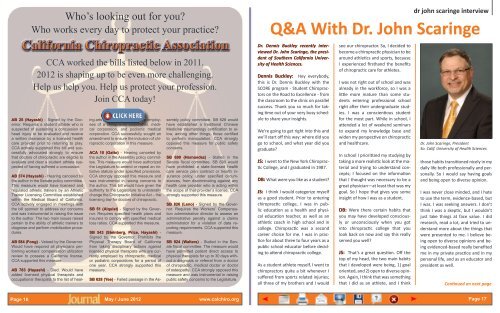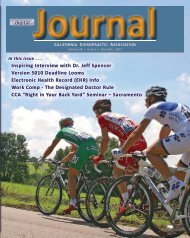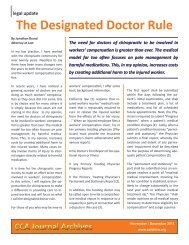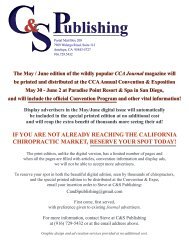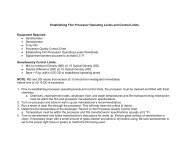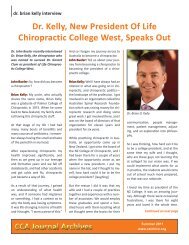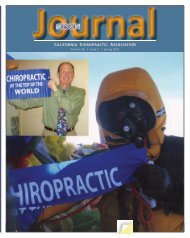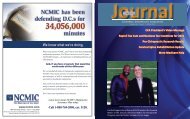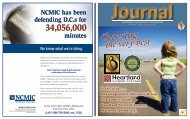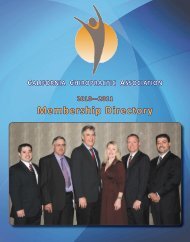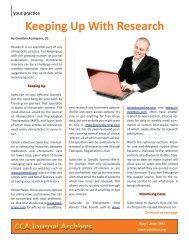Download - CCA Journal magazine
Download - CCA Journal magazine
Download - CCA Journal magazine
You also want an ePaper? Increase the reach of your titles
YUMPU automatically turns print PDFs into web optimized ePapers that Google loves.
Who’s looking out for you?<br />
Who works every day to protect your practice?<br />
California Chiropractic Association<br />
<strong>CCA</strong> worked the bills listed below in 2011.<br />
2012 is shaping up to be even more challenging.<br />
Help us help you. Help us protect your profession.<br />
Join <strong>CCA</strong> today!<br />
AB 25 (Hayashi) - Signed by the Governor.<br />
Requires a student athlete who is<br />
suspected of sustaining a concussion or<br />
head injury to be evaluated and receive<br />
a written clearance by a licensed health<br />
care provider prior to returning to play.<br />
<strong>CCA</strong> actively supported this bill and successfully<br />
advocated strongly to ensure<br />
that doctors of chiropractic are eligible to<br />
evaluate and clear a student athlete suspected<br />
of having suffered a concussion.<br />
AB 374 (Hayashi) - Hearing canceled by<br />
the author in the Senate policy committee.<br />
This measure would have licensed and<br />
regulated athletic trainers by an Athletic<br />
Trainer Licensing Committee established<br />
within the Medical Board of California.<br />
<strong>CCA</strong> actively engaged in meetings with<br />
the bill sponsor to address our concerns<br />
and was instrumental in raising the issue<br />
to the author. The two main issues raised<br />
pertain to the ability of athletic trainers to<br />
diagnose and perform mobilization procedures.<br />
AB 584 (Fong) - Vetoed by the Governor.<br />
Would have required all physicians performing<br />
workers’ compensation utilization<br />
review to possess a California license.<br />
<strong>CCA</strong> supported this measure.<br />
AB 783 (Hayashi) - Died. Would have<br />
added licensed physical therapists and<br />
occupational therapists to the list of healing<br />
arts practitioners who may be employees<br />
of a chiropractic corporation, medical<br />
corporation, and podiatric medical<br />
corporation. <strong>CCA</strong> successfully sought an<br />
amendment to ensure the inclusion of chiropractic<br />
corporation in this measure.<br />
ACA 10 (Gatto) - Hearing canceled by<br />
the author in the Assembly policy committee.<br />
This measure would have authorized<br />
the Legislature to amend or repeal an initiative<br />
statute under specified provisions.<br />
<strong>CCA</strong> strongly opposed this measure and<br />
was instrumental in raising concerns to<br />
the author. This bill would have given the<br />
authority to the Legislature to unilaterally<br />
change the Chiropractic Initiative Act – the<br />
licensing law for doctors of chiropractic.<br />
SB 51 (Alquist) - Signed by the Governor.<br />
Requires specified health plans and<br />
insurers to comply with specified medical<br />
loss ratios. <strong>CCA</strong> supported this measure.<br />
SB 543 (Steinberg, Price, Hayashi) -<br />
Signed by the Governor. Prohibits the<br />
Physical Therapy Board of California<br />
from taking disciplinary actions against<br />
licensed physical therapists who are currently<br />
employed by chiropractic, medical<br />
or podiatric corporations for a period of<br />
one year. <strong>CCA</strong> strongly supported this<br />
measure.<br />
SB 628 (Yee) - Failed passage in the Assembly<br />
policy committee. SB 628 would<br />
have established a traditional Chinese<br />
Medicine traumatology certification to allow,<br />
among other things, those certified<br />
to perform manipulation. <strong>CCA</strong> strongly<br />
opposed this measure for public safety<br />
concerns.<br />
SB 690 (Hernandez) - Stalled in the<br />
Senate fiscal committee. SB 690 would<br />
have prohibited a state-licensed health<br />
care service plan contract or health insurance<br />
policy, under specified circumstances,<br />
from discriminating against any<br />
health care provider who is acting within<br />
the scope of that provider’s license. <strong>CCA</strong><br />
strongly supported this measure.<br />
SB 826 (Leno) - Signed by the Governor.<br />
Requires the Workers’ Compensation<br />
administrative director to assess an<br />
administrative penalty against a claims<br />
administrator for a violation of data reporting<br />
requirements. <strong>CCA</strong> supported this<br />
measure.<br />
SB 924 (Walters) - Stalled in the Senate<br />
fiscal committee. The measure would<br />
have permitted patient direct access to<br />
physical therapists for up to 30 days without<br />
a diagnosis or referral from a doctor<br />
of chiropractic, medical doctor or doctor<br />
of osteopathy. <strong>CCA</strong> strongly opposed this<br />
measure and was instrumental in raising<br />
public safety concerns to the Legislature.<br />
dr john scaringe interview<br />
Q&A With Dr. John Scaringe<br />
Dr. Dennis Buckley recently interviewed<br />
Dr. John Scaringe, the president<br />
of Southern California University<br />
of Health Sciences.<br />
Dennis Buckley: Hey everybody,<br />
this is Dr. Dennis Buckley with the<br />
SCORE program - Student Chiropractors<br />
on the Road to Excellence - from<br />
the classroom to the clinic on parallel<br />
success. Thank you so much for taking<br />
time out of your very busy schedule<br />
to share your insights.<br />
We’re going to get right into this and<br />
we’ll start off this way: where did you<br />
go to school, and what year did you<br />
graduate?<br />
JS: I went to the New York Chiropractic<br />
College, and I graduated in 1987.<br />
DB: What were you like as a student?<br />
JS: I think I would categorize myself<br />
as a good student. Prior to entering<br />
chiropractic college, I was in public<br />
education as a health and physical<br />
education teacher, as well as an<br />
athletic coach in high school and in<br />
college. Chiropractic was a second<br />
career choice for me. I was in practice<br />
for about three to four years as a<br />
public school educator before deciding<br />
to attend chiropractic college.<br />
As a student athlete myself, I went to<br />
chiropractors quite a bit whenever I<br />
suffered from sports related injuries;<br />
all three of my brothers and I would<br />
see our chiropractor. So, I decided to<br />
become a chiropractic physician to be<br />
around athletics and sports, because<br />
I experienced firsthand the benefits<br />
of chiropractic care for athletes.<br />
I was not right out of school and was<br />
already in the workforce, so I was a<br />
little more mature than some students<br />
entering professional school<br />
right after their undergraduate studies.<br />
I was a conscientious student<br />
for the most part. While in school, I<br />
attended a lot of weekend seminars<br />
to expand my knowledge base and<br />
widen my perspective on chiropractic<br />
and healthcare.<br />
In school I prioritized my studying by<br />
taking a more realistic look at the material<br />
and trying to understand concepts;<br />
I focused on the information<br />
that I thought was necessary to be a<br />
great physician—at least that was my<br />
goal. So I hope that gives you some<br />
insight of how I was as a student.<br />
DB: Were there certain habits that<br />
you may have developed consciously<br />
or unconsciously when you got<br />
into chiropractic college that you<br />
look back on now and say this really<br />
served you well?<br />
JS: That’s a great question. Off the<br />
top of my head, the two main habits<br />
that I developed were being, 1) goal<br />
oriented, and 2) open to diverse opinion.<br />
Again, I think that was something<br />
that I did as an athlete, and I think<br />
Dr. John Scaringe, President<br />
So. Calif. University of Health Sciences<br />
those habits transitioned nicely in my<br />
daily life both professionally and personally.<br />
So I would say having goals<br />
and being open to diverse opinion.<br />
I was never close minded, and I hate<br />
to use the term, evidence-based, but<br />
I was. I was seeking answers. I don’t<br />
think I was a skeptic, but I wouldn’t<br />
just take things at face value. I did<br />
research, read a lot, and tried to understand<br />
more about the things that<br />
were presented to me. I believe being<br />
open to diverse opinions and being<br />
evidenced-based really benefited<br />
me in my private practice and in my<br />
personal life, and as an educator and<br />
president as well.<br />
Continued on next page<br />
Page 16 May / June 2012 www.calchiro.org Page 17


